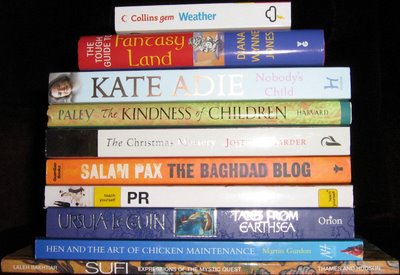new books
 There was a big booksale on today, which I went to, and bought some books. But not as many as I thought I might.
There was a big booksale on today, which I went to, and bought some books. But not as many as I thought I might.
My attitude to books has changed interestingly over the last few years.
Now that my reading list is longer than I can reasonably expect to ever get through, and there is so much reading material freely available, and other media that I want to absorb, it no longer seems worth just buying anything vaguely interesting looking. I've come to realise that the probability of actually reading the book, or being able to use it some other way (such as giving it away, or lending it out) is very important too.
So, this is what I came out with today, along with why:
- Collins Gem Weather - a guide to interpreting the sky, and what it's done, is doing, and is likely to do. This would be a nice skill to have, especially as I never watch the weather, and I like to cycle. I bought this book in order to increase my natural intepretive skills.
- The Tough Guide To Fantasy Land - This is basically a glossary of roleplaying terms and culture I think. I bought this book because it looks simple to read, reasonably entertaining, but mainly because it should give me a better understanding of role-playing, and hence one of my best friends. I bought this book in order to understand someone else.
- Nobody's Child - This is a book of Kate Adie's experiences of orphans. I have a lot of respect for Kate Adie, and I don't know much about orphans. I bought this book to learn more about Kate Adie, and through her, humanity.
- The Kindness of Children - The premise of this book is: 'Are children wiser about the nature of kindness than we think they are?' I don't think my society has the right attitude to children, hence books like this that challenge the social outlook seem likely to me to be good sources of truth and wisdom. I bought this book to learn more about humanity, and what humanity could be.
- The Christmas Mystery - Jostein Gaarder, writer of Sophie's World, writes well, thoughtfully and entertainingly. I haven't been reading enough fiction lately either, which has been tiring me out I think. Also, Sophie's World connects back to an important time in my past: reading this might reveal/grow some important links, and enable some sort of progression. I bought this book to relax with, and help set my life in better context.
- Salam Pax, The Baghdad Blog - A text that I'd like to have about me simply because I think it has historical importance: the emergence of independent internet journalism via blogging. Also, I expect there's some pretty interesting stuff in here concerning the situation in Iraq. I bought this book as a historical memento, and to flesh out my impression of the Iraq conflict.
- Teach Yourself PR - I bought this book because having a better working knowledge of PR should let me interact with PRed organisations more effectively. In a world where big organisations impact our lives a lot, this should be a useful skill.
- Tales From Earthsea - This was on my to buy list already: I read the first three Earthsea books already, and loved them, and they influenced me significantly. I bought this book to continue an ongoing thread of my life, be entertained and thought provoked. Ursula K Le Guin is an awesome writer and thinker. Anything she's written is on my reading list.
- Hen and the Art of Chicken Maintenance - I loved Zen and the Art of Motorcycle Maintenance, and I am involved with keeping chickens, so this seems like a nice book to have. I bought this book to see how I align with the rest of the chicken keeping community, and hopefully to get a better feeling for the relationship between humans and other animals.
- Sufi - Family friends raised Sufism in my consciousness recently, and got me interested. I know next to nothing about Sufism, so I bought this book to increase my awareness of humanity, and its customs.

